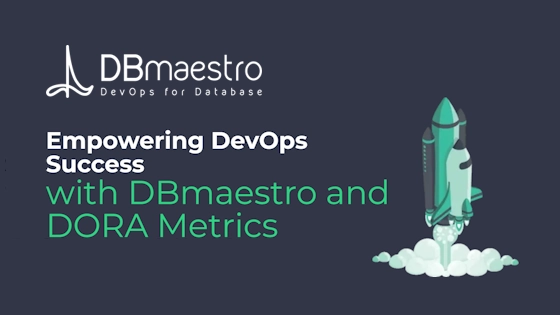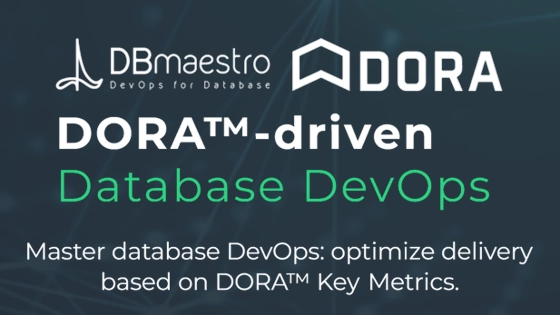The 2024 DORA Accelerate State of DevOps report highlights the ongoing transformation in technology, emphasizing themes like AI adoption, platform engineering, and the continued evolution of software delivery performance. As the CEO of DBmaestro, a leader in Database DevSecOps, I see a clear alignment between these principles and the critical need for robust database release automation. At DBmaestro, we’ve strategically adapted these insights to help organizations navigate their transformation journeys, ensuring seamless shifts to becoming data-informed enterprises.
The DORA 2024 Context
The report underscores that transformation isn’t a single event but an iterative process of improvement. High-performing organizations leverage four key metrics—change lead time, deployment frequency, change failure rate, and recovery time—to benchmark their progress. These metrics are no longer confined to application code but now extend into the database layer. Databases, as the repositories of organizational knowledge, require the same agility and reliability that DORA advocates for software delivery.
Key findings also emphasize the need for transformational leadership, stability in priorities, and platform engineering to enhance organizational performance. These align perfectly with DBmaestro’s approach, where our platform empowers leaders to streamline database operations, mitigate risks, and optimize efficiency.
Database Release Automation: A Strategic Imperative
Database release automation is central to achieving elite performance. Unlike application release pipelines, database releases encounter unique challenges:
- Complex Dependencies: Unlike modular application components, databases are interwoven with the fabric of an organization’s operations, making them susceptible to downtime and errors.
- Compliance Pressures: Regulations like GDPR and SOX add layers of complexity, necessitating strict controls on schema changes and data handling.
- Distributed Teams: Teams spread across locations often make concurrent changes to shared schemas, increasing the risk of conflicts and errors.
At DBmaestro, we address these challenges by automating database release processes, ensuring consistency, compliance, and collaboration. Our approach reduces change lead times while enhancing stability, enabling organizations to achieve the high throughput DORA metrics celebrate.
-
Accelerated Delivery
As outlined in the DORA report, elite performers deploy changes 182 times more frequently and recover from failures 2,293 times faster than low performers. This is a direct result of automating processes across the development pipeline, including database changes. DBmaestro supports this by integrating automation into CI/CD pipelines, reducing the likelihood of manual errors. Our platform tracks every change, offering rollbacks and recovery options to minimize downtime, aligning with the DORA principle of recovery metrics.
-
Improved Stability and Reliability
Teams with strong DevOps practices reduce recovery times to under an hour for most failures, ensuring high uptime and reliability. By automating database release management and monitoring, DBmaestro ensures that teams can quickly recover from failures, maintaining a stable and reliable database environment. This supports DORA’s goal of reducing recovery times and maintaining operational stability, ensuring seamless customer experiences and continued business operations.
-
Boosts Productivity
According to the DORA findings, teams using internal platforms (a DevOps practice) see 8% higher individual productivity and 10% better team performance. DBmaestro’s internal platform is designed to empower developers by providing a self-service model for database changes, enabling teams to focus on higher-value tasks rather than manual intervention. Our platform accelerates workflow automation, helping organizations boost both individual and team productivity, ultimately aligning with DORA’s emphasis on performance improvement.
-
Enhanced Collaboration
The DORA report highlights that DevOps promotes cross-functional coordination, with teams reporting a 3% improvement in approval and review speeds due to automated processes. DBmaestro fosters collaboration by automating schema change approval workflows and providing real-time visibility into database changes. This reduces friction between development, QA, and operations teams, enhancing communication and speeding up the approval process for database changes.
-
Competitive Advantage
Organizations with mature DevOps capabilities report up to 23% higher customer satisfaction and 22% greater operational efficiency. Investing in DevOps, particularly through database automation, provides a clear competitive edge. DBmaestro enables organizations to deliver faster, more reliable database changes, enhancing both customer satisfaction and operational efficiency—directly aligning with DORA’s findings on the business impact of mature DevOps practices.
-
Supports Scalability
Cloud-enabled DevOps practices provide flexible infrastructure, which increases organizational performance by 6% when combined with automation. DBmaestro’s platform integrates with cloud environments, enabling organizations to scale their database operations seamlessly. Whether running on-premises or in the cloud, our platform supports flexible, scalable database release automation, ensuring performance remains high as organizations grow.
-
Quantifiable Business Impact
The DORA report notes that companies leveraging DevOps achieve 2.3% higher organizational performance and 1.4% better team dynamics for every 25% increase in DevOps adoption. By adopting DBmaestro’s database automation, organizations can measure and track improvements in database change processes, directly contributing to these business performance metrics.
Conclusion
This first part of the article outlines the key insights from the DORA 2024 report and how DBmaestro’s database release automation aligns with these principles. By adopting DBmaestro, organizations can experience accelerated delivery, improved stability, increased productivity, enhanced collaboration, competitive advantage, and scalability—all while achieving quantifiable business results. In the next article, we will explore how DBmaestro’s platform specifically embodies these DORA principles to further empower users and drive business transformation.







